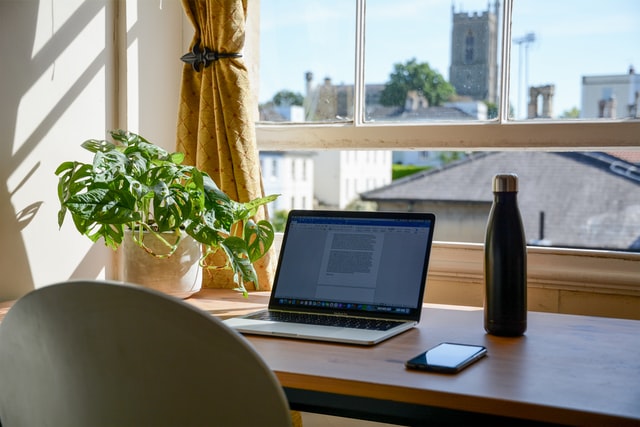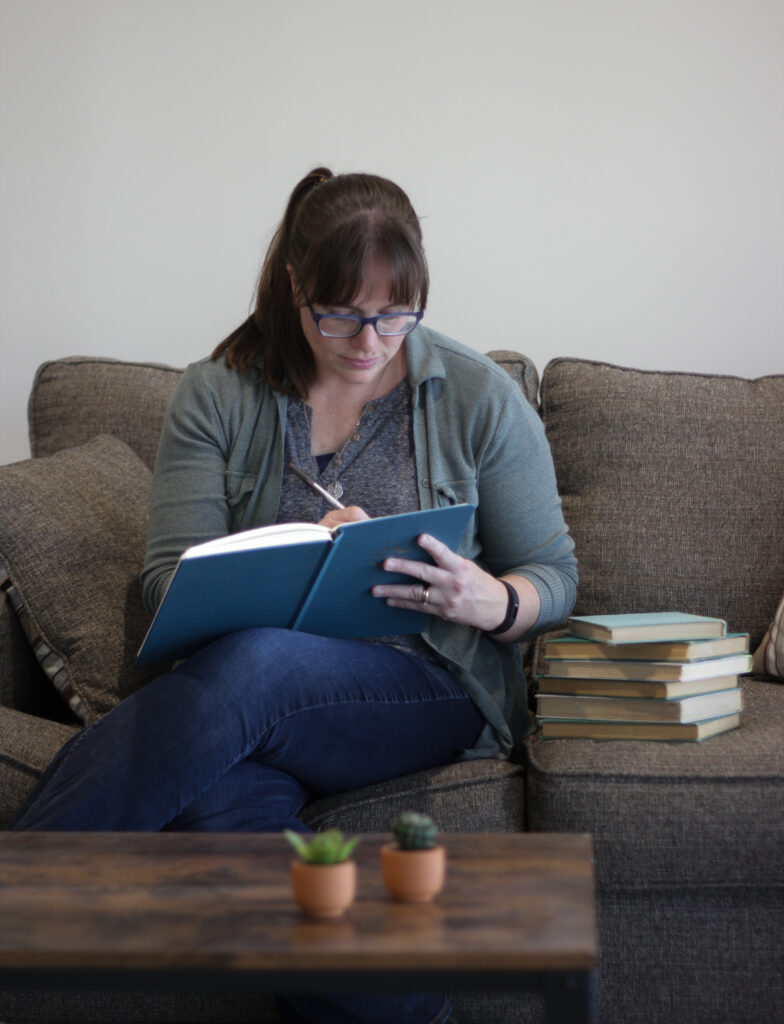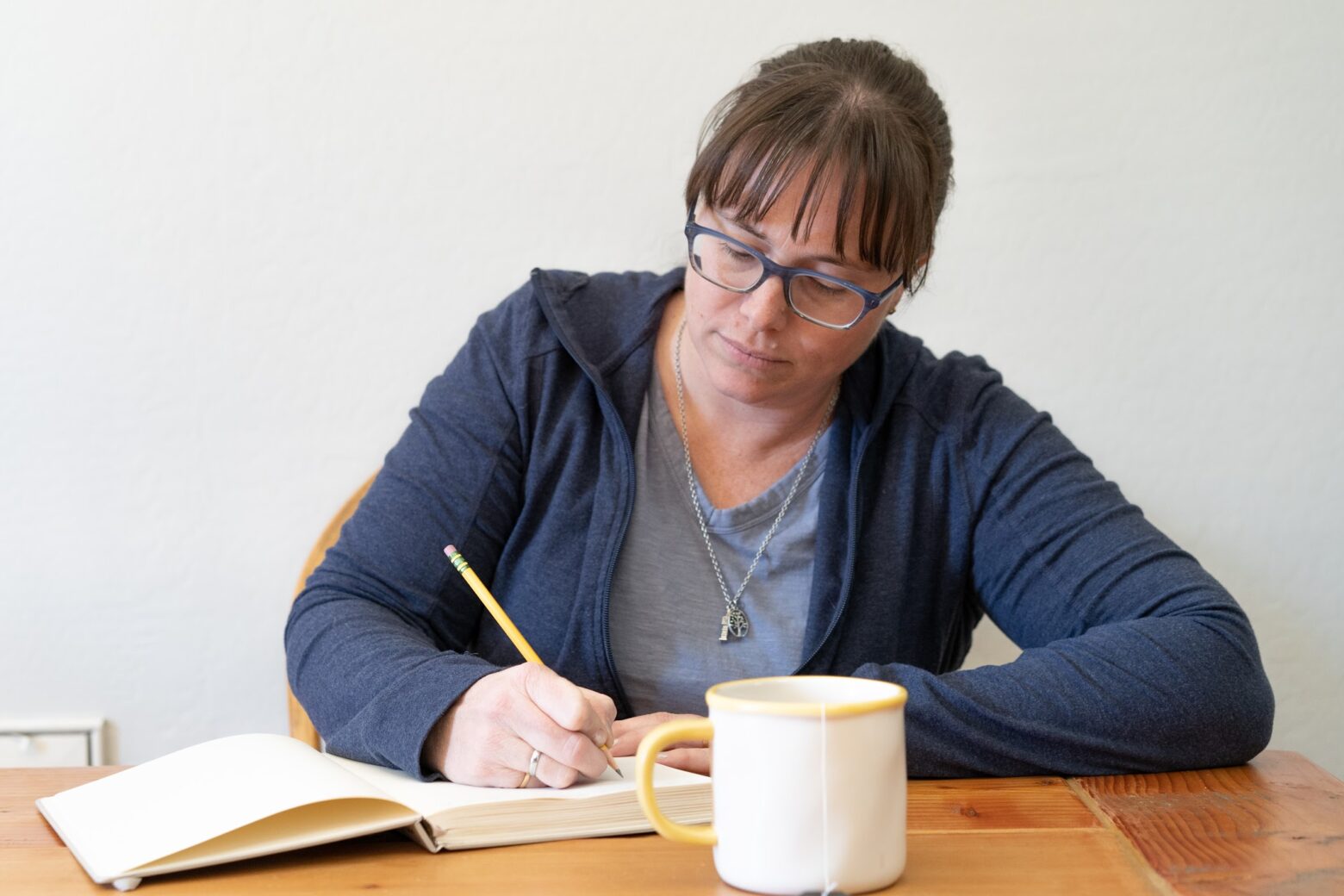Let’s jump straight into why writing feels so isolating. I am a beginner and I am learning this process.
I hope to help you feel seen and less alone by being vulnerable about the challenges I face and the frustrations I have experienced.
I also share 6 solutions that are working for me.

Photo by Mikey Harris on Unsplash
#1. Writing is not well defined.
Your writing can be a hobby, a job, a craft, or an activity for enjoyment. It can be whatever you want it to. Which can be very freeing but also very frustrating. How much time you spend on it may change what type of place it holds. It will most likely not bring in income and can be hard to justify spending time on.
- YouTube video: Elizabeth Gilbert on Distinguishing Between Hobbies, Jobs, Careers, & Vocation
- “A hobby is defined as something you do purely for pleasure.”
- A job is the way you pay the bills – you have to have this to be a responsible adult.
- “A career is a job that you are passionate about.” Most people do not get to write as their career.
- “A vocation is a calling, a divine invitation.. the highest pursuit.” This can live separately from income or attention from others.
#2. It requires space for deep thinking and concentration.
Your environment needs to be set up in a way for you to be successful. This is different for each person and for each life stage you are in. It can even change with your daily schedule.
- What do you need to write?
- Do you need quiet?
- Do you need to be at home alone?
- Does it help to be at a library or a coffee shop?
- What supplies do you need?
- Do you have small kids at home?
- Do you enjoy lots of activity and people around you?
- Are you able to concentrate in the midst of other activities?
- Do you have pets that will distract you from what you need to do? (I am asking from experience.)
- Where are you planning on writing? What can you do to make that space calm for deep work?
Here is the Hope Writers podcast where they discuss different writing locations and why.
- Plan Your Perfect Writing Day
- The Day I Realized I Had a Job
- This article might help you as well: Writing in the Wild
#3. Writing looks different for each personality type.
Depending on your personality; when, where, what, and how you write will be different.
This YouTube video is hilarious and helpful insight: Leeann & Michelle – Enneagram Types as Writers
I love this YouTube video! It features my favorite writing group that I am a part of and my favorite Enneagram YouTube team! We all need to think about our unique personalities and how that adds to our writing.
#4. Writing can be a difficult path to travel.
One writing session can be life-giving, frustrating, and very draining all in a few hours. Which can be so confusing. In my life, most overwhelming events happen with other people. Emotions, situations, drama, and conflict from others is enough for me to get some space alone to process.
But the work of writing can be like having an argument with a close friend. You could be the only person in the room, it can be productive, and yet you feel so defeated. It is very easy to get discouraged and find it difficult to keep making progress.
#5. Inspiration arrives at odd times.
Inspiration often shows up when you are busy with other things. Words can come to you while you are taking a walk, making dinner, cleaning, and going to sleep. Inspiration does not follow a clock or a schedule. It does not show up at the appointed time with all the paperwork. Inspiration is a terrible subordinate and an unfaithful companion.

Photo by Jessica Lewis on Unsplash
So, what do we do? How do we move forward in this messy craft we have undertaken?
With so many difficulties, what do we try to make progress?
Let’s get practical April, I need answers!
Excellent questions, here are some things that I am putting to use in my writing life.🙂
Straight forward solutions I use in my writing journey:
- Have a capture system. Choose how you will grab ideas and sentences that come to you when you are busy doing other things. Pick something that is quick, accessible, and easy to navigate.
- Use an app on your phone like Evernote.
- Get a cheap spiral notebook to keep nearby.
- Have notecards at the ready stashed in your purse.
- Find something that works for you and then use it.
- Here is a useful and excellent podcast for this topic: How To Capture and Organize All Your Awesome Writing Ideas
- Read great books about writing –
- Big Magic: Creative Living Beyond Fear by Elizabeth Gilbert – Her thoughts on how ideas come to you is so right on. I nearly dropped the book when I read it! She is funny and transparent about the writing process in a way I have not experienced other places.
- & see this article for more: Enjoying summer & reading Big Magic
- The Artist’s Way by Julia Cameron – I am only a few chapters in on this book and already having major breakthroughs. I will share more thoughts soon. This book came highly recommended from multiple sources and I am so glad I am reading it!
- Simple Writing Tips & Inspiration – for more books see this article.
- Big Magic: Creative Living Beyond Fear by Elizabeth Gilbert – Her thoughts on how ideas come to you is so right on. I nearly dropped the book when I read it! She is funny and transparent about the writing process in a way I have not experienced other places.
- Develop routines – Rhythms and routines help you make the most of pieces of time that appear in your schedule. Create a routine for when you will do writing. Then do that routine every time you have an hour or more to write. You will be surprised how effective it will be to get you focused and “in writing mode”.
- See more about that in this article: Simple Writing Tips & Inspiration
- and this one: Rituals, Routines, and Rhythms – What’s the Difference?
- Message me if you are interested in more articles on routines in writing…🙂
- Find community – Yes, sitting alone with my thoughts and writing all the words is how I get the most writing done. But it does not have to feel lonely. It is comforting knowing that other writers are struggling with the same things, sitting in their writing spots, staring at their empty text documents, and over thinking their work too.
- C.S. Lewis and his gathering of great authors was described in a historical fiction book I read. (Becoming Mrs. Lewis by Callahan) These authors would meet weekly at their table at the Eagle and Child pub. They shared their writing struggles, compared edits, and read aloud chapters where they were stuck.
- This was so inspiring for me! I also have a book reserved at the library that I am hoping to read soon. (Bandersnatch: C.S. Lewis, J.R.R. Tolkien, and the Creative Collaboration of the Inklings)
- “C.S. Lewis, J.R.R. Tolkien, and the Inklings met each week to read and discuss each other’s work-in-progress, offering both encouragement and blistering critique. How did these conversations shape the books they were writing? How does creative collaboration enhance individual talent? And what can we learn from their example?” (from Bandersnatch by Glyer)
- Hope*Writers community – This is the place where I have found answers to so many questions and even some I did not know to ask. I feel understood and supported in this online place. I have been able to move forward with confidence and in my own way.
- Take short breaks – Press the save button and then walk away from your writing.
- Walk around the house.
- Get a fresh cup of ice water or an apple.
- Do some stretching and climb the stairs a few times.
- Go outside and stare at the clouds for a few minutes.
- Check on the pets, house plants, or the kids.
- Change how you are doing writing for 30 minutes. Walk around and talk text into your phone with Evernote. Get out a cheap spiral notebook and write it long hand. Call a friend and process the article out loud.
- I love the Pomodoro Technique for this reason. So helpful!
But also, pay attention to the line you cross into distraction and procrastination. Only you know where this line is for your writing life.
- Take long breaks – “Your pace is your pace. There’s no such thing as behind.” – Emily P. Freeman. This is my favorite quote in this season of my writing. It can be easy to get sucked into a scarcity mentality. This looks like rushing, feeling behind, in a hurry because someone else will take your ideas, and being in competition with other writers.
The mindset of Abundance looks like living with an open hand. Knowing that ideas, things you need, and people who will help you, will come into your life when you need them.
- I often spend time writing and then let it sit for several days. Like it needs to marinate for a while.
- Give yourself the gift of Sabbath. (see these articles for more info: Sabbath Living)
- Choose when you will take a weekend away from your writing and then do it.
- If inspiration comes while you are taking a break you can decide if it is worth jotting down or just enjoying for the moment. (There are no set rules – you get to decide.)
“Your pace is your pace. There’s no such thing as behind.”
– Emily P. Freeman

Photo from Unsplash
Yes, I am a beginner in this task/hobby/area of writing. But we have all been beginners in something. We are all just trying to move the needle forward on what matters to us, in the time we have, with the skills we have right now.
In my process of becoming a writer, I have learned a new term called imposter syndrome. It is the feeling of not being qualified and not being the right person for the job. That other people actually know what they’re doing and I am just guessing.
We all struggle with feeling like we don’t have something to offer. Like our words don’t matter and that we are not enough. It starts when we are young and often our fears are realized by those around us who are selfish or insensitive. But it also continues into adulthood.
Our society has this idea that we must be an expert at something before we can start. But, there is something very valuable about being a beginner. We might make a lot of mistakes, we might do things in the wrong way, but the newness gives us a fresh perspective. We are able to make connections with other things that we know.
I have not identified myself as a writer until this year. It is a big learning curve and I feel exposed. I am learning things that others have known for a long time and skills that my own high schooler has mastered already. It is hard to share when you are in the transition of something. Hard to be vulnerable when you are in the middle and you do not know how things will turn out.
This blog is that place for me. It is my honest sharing, with the skills I have now, with my own hard-earned stories and lessons. I hope that you feel welcomed here. That you show up as you are, wherever you are, ready to stand alongside me as a friend.
There is no room for judgment here. Criticism and jealousy do not get to be here in this space. Ideas, prompting from our intuition, and God’s quiet voice can not live with those things. Growth dies in a place where we look at each other with the side-eye or our noses high.
Your words matter. Your writing is important no matter what you do with it. You do not need an audience to have your writing validated. Do what you have been called to do and you will feel alive. It is a learning process.
Happy Writing – April

Writing is layered and difficult. There are so many pieces to starting something new and making space for creativity.
Here are some articles to help:
- This article will help you if you are stuck and not sure how to get started with writing.
- See this article for how I make space for my writing:
You are ready to share your message, you have made space for writing… now what next?
- What if the words don’t just flow onto the page like you had hoped?
- I have learned that my energy and my time are the most valuable assets for me to keep an eye on.
- Or maybe you need space in your household duties.
- More on the basics of energy levels and how I use them in my home: 5 Energy Levels in Homemaking.
-
Join me on Substack!
Hey! Hello! 😁 I am so glad you have found my blog! This is my home place where I test out writing work, post weekly articles, and share updates on my books. I love having my own corner of the internet that I can call my own. Unfortunately because of bots and ugly internet trolls,……
-
How I Became an Angry Mom & the Antidote I Found
Lifelong learning in the margins & how small curiosities brought me back to life. There is an unparalleled exhaustion to understanding and then meeting the needs of babies and small children. They are compelled to demand what they need at all times of the day and night. This is a tremendous strain and physically draining,……

